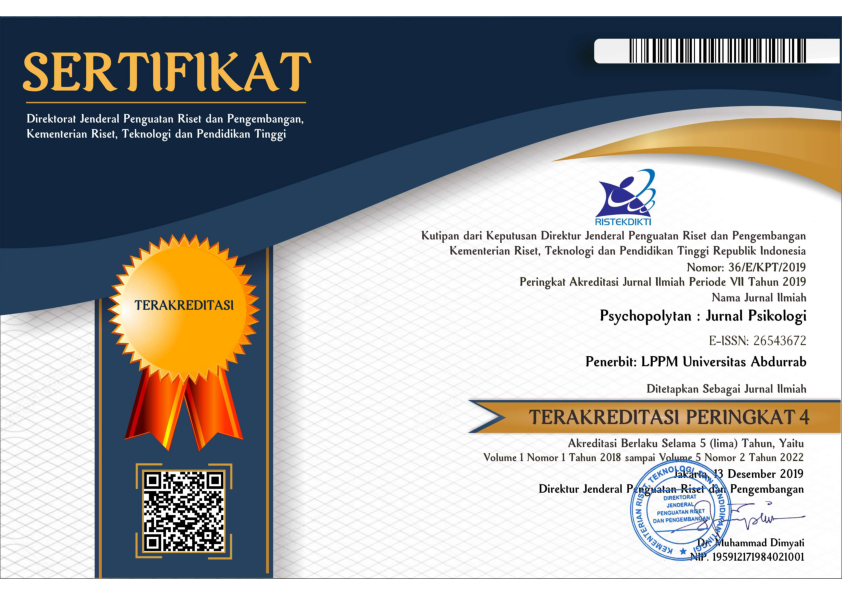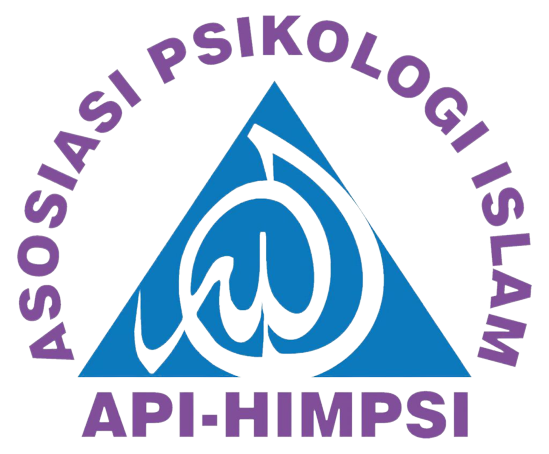Dukungan Komunitas Belajar dan Ketekunan Akademik Pada Mahasiswa
(Submitted 1 Maret 2021) (Published 31 Agustus 2021)
Abstract
Ketekunan akademik sangat diperlukan bagi mahasiswa agar dapat menyelesaikan pendidikan di perguruan tingggi dengan baik. Tujuan penelitian ini untuk mengetahui korelasi dukungan komunitas belajar terhadap ketekunan akademik pada mahasiswa. Responden dalam penelitian ini adalah mahasiswa fakultas psikologi universitas X berjumlah (n) = 214 yang terdiri dari 47 laki-laki dan 167 perempuan, dengan teknik sampling menggunakan cluster random sampling. Pengumpulan data menggunakan skala dukungan sosial dengan realiabilitas alpha cronbach 0,957 dan skala ketekunan akademik dengan reliabilitas alpha cronbach 0,865. Hasil analisa data menggunakan uji korelasi product moment pearson diperoleh koefisien korelasi rxy = 0,565 dengan signifikansi (p)=0,000 (p<0,001). Hasil ini membuktikan bahwa dukungan sosial komunitas belajar berkorelasi positif dengan ketekunan akademik. Implikasi dari penelitian ini bahwa mahasiswa perlu memiliki kelompok belajar yang dapat memberi dukungan secara akademik maupun non akademik.
References
Bagian Administrasi Akademik (BAA). (2021). Laporan data mahasiswa aktif-non aktif.
Baker, L. L. (2017). What It Takes to Succeed: The Importance of Social Support for Academically Successful Middle School English Learners. Youth and Society, 49(5), 658–678. https://doi.org/10.1177/0044118X14553581
Cohen, S. (2004). Cohen (2004) - Social Relationships and Health. American Psychologist, November, 676–684.
Furrer, C., & Skinner, E. (2003). Sense of relatedness as a factor in children’s academic engagement and performance. Journal of Educational Psychology, 95(1), 148–162. https://doi.org/10.1037/0022-0663.95.1.148
Gloria, A. M., & Ho, T. A. (2003). Environmental, social, and psychological experiences of asian american undergraduates: Examining issues of academic persistence. Journal of Counseling and Development, 81(1), 93–105. https://doi.org/10.1002/j.1556-6678.2003.tb00230.x
Grant, N., Hamer, M., & Steptoe, A. (2009). Social isolation and stress-related cardiovascular, lipid, and cortisol responses. Annals of Behavioral Medicine, 37(1), 29–37. https://doi.org/10.1007/s12160-009-9081-z
Gray, R., Vitak, J., Easton, E. W., & Ellison, N. B. (2013). Examining social adjustment to college in the age of social media: Factors influencing successful transitions and persistence. Computers and Education, 67, 193–207. https://doi.org/10.1016/j.compedu.2013.02.021
Lotkowski, V. a, Robbins, S. B., & Noeth, R. J. (2004). The Role of Academic and Non-Academic Factors in Improving College Retention. Office, September 12, 2007, 1–31.
Muwonge, C. M., Schiefele, U., Ssenyonga, J., & Kibedi, H. (2017). Determinants of persistence among science teacher-trainees: Examining the role of self-efficacy, task value, and academic hope. Journal of Science Teacher Education, 28(6), 522–548. https://doi.org/10.1080/1046560X.2017.1379860
Nicpon, M. F., Huser, L., Blanks, E. H., Sollenberger, S., Befort, C., & Kurpius, S. E. R. (2006). The relationship of loneliness and social support with college freshmen’s academic performance and persistence. Journal of College Student Retention: Research, Theory and Practice, 8(3), 345–358. https://doi.org/10.2190/A465-356M-7652-783R
Roland, N., Frenay, M., & Boudrenghien, G. (2016). Towards a Better Understanding of Academic Persistence among Fresh-men: A Qualitative Approach. Journal of Education and Training Studies, 4(12). https://doi.org/10.11114/jets.v4i12.1904
Sarafino, E. P., & Smith, T. W. (2014). Health psychology: biopsychosocial interactions (Eighth). Wiley.
Shiddiq, M. I., Fitra, M. A., Patricia, R., Afriani, D. I., Bahar, F. A., & Malay, E. D. (2020). Social Support is Positively Correlated With College Adjustment in First-Year Students. 494(Iciap 2019), 549–558. https://doi.org/10.2991/assehr.k.201125.046
Skahill, M. P. (2002). The Role of Social Support Network in College Persistence among Freshman Students. Journal of College Student Retention: Research, Theory & Practice, 4(1), 39–52. https://doi.org/10.2190/lb7c-9ayv-9r84-q2q5
Swenson Goguen, L. M., Hiester, M. A., & Nordstrom, A. H. (2010). Associations among peer relationships, academic achievement, and persistence in college. Journal of College Student Retention: Research, Theory and Practice, 12(3), 319–337. https://doi.org/10.2190/CS.12.3.d
Swenson, L. M., Nordstrom, A., & Hiester, M. (2008). The role of peer relationships in adjustment to college. Journal of College Student Development, 49(6), 551–567. https://doi.org/10.1353/csd.0.0038
Thalib, T., Hanafi, S., & Irbah, S. (2018). The Academic Persistence Scale. Science And Education For Improving Learning Quality In Moluccas Archipelago, May 2019, 122–130.
Yahya, M., & Bahri, S. (2016). Identifikasi Masalah-masalah yang dialami mahasiswa fakultas teknik dan ekonomi UNSYIAH. Jurnal Bimbingan Konseling FKIP UNSYIAH, 1(1), 37–39.
Yazedjian, A., Purswell, K., Sevin, T., & Toews, M. (2007). Adjusting to the First Year of College: Students’ Perceptions of the Importance of Parental, Peer, and Institutional Support. Journal of the First-Year Experience & Students in Transition, 19(2), 29–46.
Copyright (c) 2021 Psychopolytan : Jurnal Psikologi

This work is licensed under a Creative Commons Attribution-NonCommercial-ShareAlike 4.0 International License.
1. Copyright of all journal manuscripts is held by the Psychopolytan : Jurnal Psikologi
2. Formal legal provisions to access digital articles of electronic journal are subject to the provision of the Creative Commons Attribution-ShareAlike license (CC BY-NC-SA), which means that Psychopolytan : Jurnal Psikologi is rightful to keep, transfer media/format, manage in the form of databases, maintain, and publish articles.
3. Published manuscripts both printed and electronic are open access for educational, research, and library purposes. Additionally, the editorial board is not responsible for any violations of copyright law.
licensed under a Creative Commons Attribution-ShareAlike 4.0 International License.
 pdf
pdf
 Abstract views: 495
Abstract views: 495
 downloads: 425
downloads: 425

 :
:








